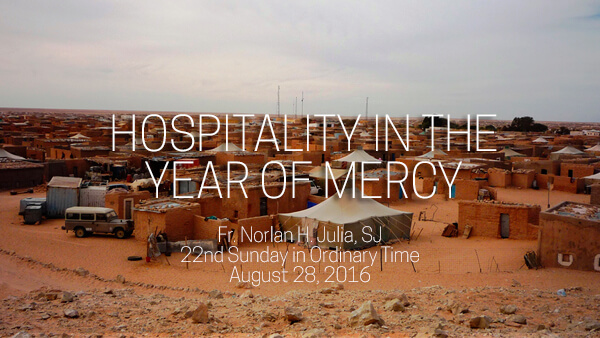


Fr. Norlan H. Julia, SJ
22nd Sunday in Ordinary Time
August 28, 2016
Mother Teresa and Lady Diana are two women who have captured the imagination of many people. Despite their popularity, they somehow seemed close to people’s hearts that their passing away in 1997, days apart, caused grief among their many followers and fans. Two women, worlds apart in the way they lived: one in the slums and gutters of Calcutta, the other in the castle and glitters of Buckingham. One walked around in plain white sari, the other went about in glamorous apparel worthy of a princess. But both of them shared one thing in common: a heart for the poorest of the poor.
Mother Teresa, born Agnes Gonxha Bojaxhiu, was born on 26 August 1910, in Skopje, Macedonia. In 1928, she joined the Loreto Convent in Dublin, Ireland as a postulant. After almost 20 years in the convent, in 1946, she received what she thought to be a “call within a call.” Hence, she left the convent and founded Missionaries of Charity. She felt that their call is “to quench the infinite thirst of Jesus on the cross for love and souls” by “labouring at the salvation and sanctification of the poorest of the poor.” And for the next 51 years, she and her sisters would spend feeding the hungry, clothing the naked, caring for the sick, sheltering the homeless orphans and elderly. In a word, Mother Teresa exercised hospitality through the works of mercy.
Princess Diana Spencer was born on July 1, 1961, near Sandringham, England. She was married to Prince Charles, heir to the British monarch’s throne. Their marriage, however, out of which two princes were born, ended in divorce. Diana’s fairy tale sadly turned tragic when she and her boyfriend died in a car crash as they tried to escape from paparazzis on August 30, 1997. Despite the evident sadness surrounding her married life, Diana devoted herself to her sons and to charitable efforts as the battle against the use of land mines and the campaign to feed hungry children in Africa. Her legacy lives on through the Diana, Princess of Wales Memorial Fund, which supports initiatives to provide care to the sick in Africa, help refugees, and stop the use of land mines. Amidst the fame and fancy of her royal and celebrity status, Diana exercised hospitality through her charitable works on behalf of the poor.
On this Jubilee Year of Mercy, we are called especially to practice the Christian virtue of hospitality. We are asked to give welcome especially to our brothers and sisters in the margins and peripheries of society. The gospel enumerates them: the poor, the lame, the blind. In our day and time, we might add: the beggars, the refugees, those displaced by wars in our own country and elsewhere in the world, the differently abled, the mentally challenged etc. In short, all those who do not find welcome in their own families and communities. Pope Francis envisions a hospitable Church, one whose doors are open to welcome people whoever they are: “The Church is called to be the house of the Father, with doors always wide open… Everyone can share in some way in the life of the Church; everyone can be part of the community … The Church is not a tollhouse; it is the house of the Father, where there is a place for everyone…” (Evangelii Gaudium, 47).